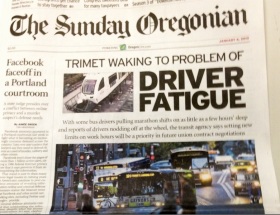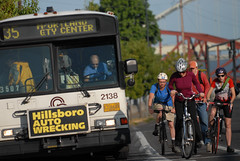
On Sunday, The Oregonian published a major front page story on the issue of driver fatigue at TriMet. The report was the result of an eight month investigation into driving records and the findings are quite disconcerting to say the least. As someone who regularly shares the road just inches from buses and MAX trains, the thought that a driver might be drowsy or asleep at the wheel is very scary.
The Oregonian story recounts several anecdotes and backs them up with TriMet’s own reports and other documentation. In one example, reporter Joseph Rose wrote that, “In a 2010 case a veteran Line 75 driver decided to retire rather than fight a report that he fell asleep at the wheel ‘almost every day.'” When a rider complained that one driver had completely fallen asleep at a stop, the driver was never disciplined.
TriMet Director of Operations Shelly Lomax told the paper, “We do not have a policy against closing one’s eyes.”
The story cites several reasons for the “culture of exhaustion” at TriMet. Chief among them is that it’s cheaper for the agency to pay for overtime than to hire more operators and union rules are too easily bent by operators eager to rack up overtime pay.
Here’s more from The Oregonian:
“the budget-battered agency allows operators to manipulate work rules to log as many as 22 hours in a 24-hour period, filling open runs and fattening paychecks but crashing vehicles and terrifying riders along the way… The Oregonian found that many drivers spend 18, 19, 20 hours or more on the job in 24 hours.”
Local TriMet watchers are calling the revelations in the story, “shocking” and “disturbing.”
From a bike perspective, this problem is even more of a concern. Many of the busiest bike routes throughout the city — like SE Hawthorne and N Williams — are also high-frequency bus lines. On the new protected bike lanes on NE Multnomah Blvd in the Lloyd District, bikes and buses mix at intersections and stops. In locations like these, even a momentary lapse of attention can result in tragedy.
There’s a certain level of trust we put into the hands of bus operators. We expect them to be aware and alert in order to not run into us. TriMet must now rebuild that trust.
TriMet has responded to the story on their blog. Lomax wrote, “We… assure you that we have a safe system that you can trust.” The response did not directly address the facts published in The Oregonian story, nor did it outline any immediate policy changes.
We’re waiting to see what TriMet does to address their driver fatigue problem. Assurances on a blog that safety is a “core value” mean nothing when actions prioritize cost-cutting over public safety. The community should not settle for anything less than strong policy changes, discipline when necessary, and other actions to rebuild public trust.
— Read The Oregonian story here.


